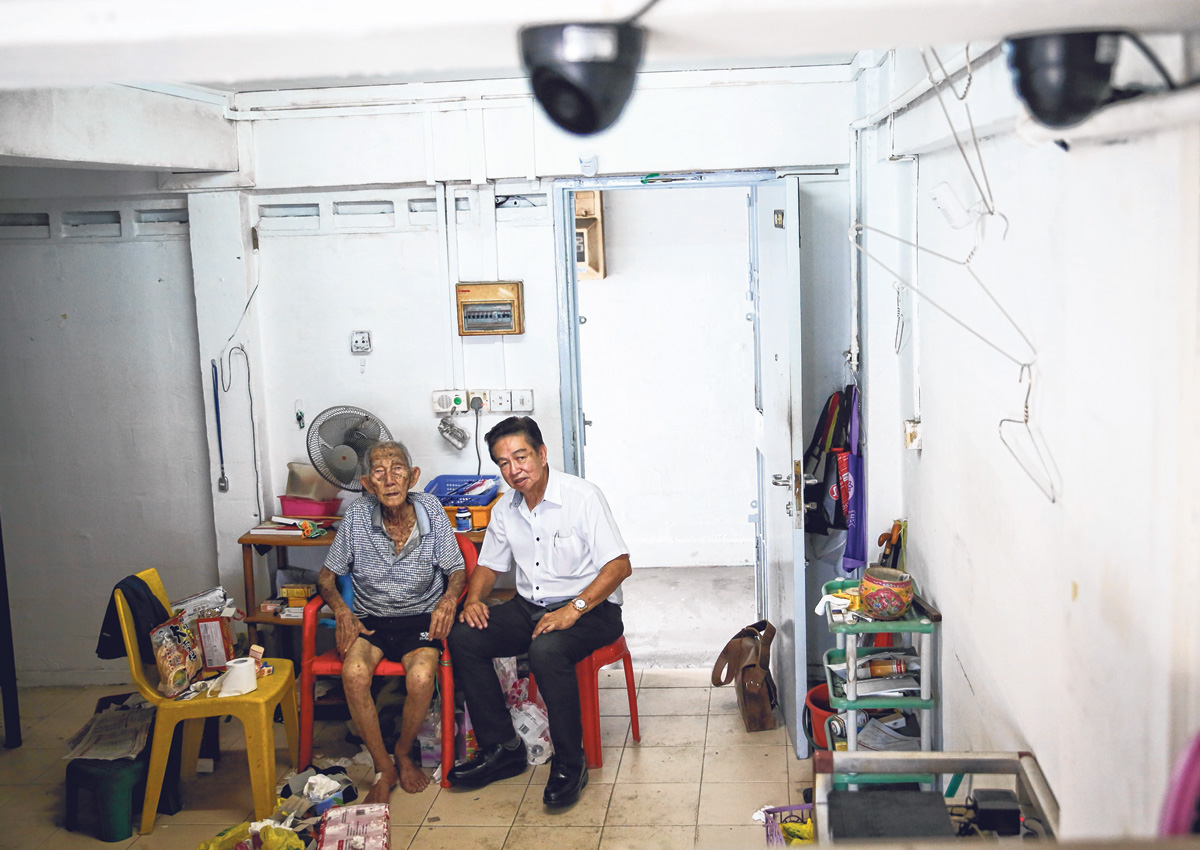Eighty-five-year-old Mr Wee Yok Tai has lived in the same one-room flat in King George’s Avenue for 30 years and is terrified that he will die alone in it.
The retired cleaner has no family and lives by himself in the spartan rental unit. He counts among his possessions a worn mattress, an empty fridge and two CCTV cameras on the ceiling.
They were installed about a year ago by undertaker Roland Tay, who came up with the unusual idea when Mr Wee asked him for help.
Mr Tay paid $1,000 for the equipment and monitors live footage from it at least three times a day using his mobile phone to check that Mr Wee is all right. Should anything happen, he will head over to help.
“I am alone, and there is no one to take care of me,” Mr Wee said in Hokkien. “Two of my neighbours died and people found out only because of the smell. I don’t want the same thing to happen to me.”
Mr Tay, known for arranging free funerals for murder victims and the needy, suggested setting up a CCTV network, with one camera monitoring the bed and the other the outside of the toilet.
“I could visit him every two or three days instead, but if something happened, it would be too late already,” said Mr Tay, who still makes it a point to visit Mr Wee every few weeks.
Privacy concerns are the least of the octogenarian’s worries.
“I see (Mr Tay) as a friend. I’m in my old age already, and when I die, I want someone to know,” said Mr Wee, who got to know Mr Tay through friends.
Mr Wee has severe arthritis and cannot walk without using a cane. The pain means he spends much of his day seated on a plastic stool in the middle of the room.
“Every day, I sit here and then I sleep, I just don’t want to fall down,” said Mr Wee, who fears that such an accident could kill him. The bachelor’s fear highlights a very real concern elderly residents living alone here face, a problem that social workers say will only get worse as society ages.
According to the General Household Survey released last month, the proportion of households comprising only residents aged 65 or older stood at 82,600, or 6.7 per cent of all households. About half of this number, or 41,200, is made up of residents who live alone.The Government estimates that by 2030, this number will hit 83,000.
Health concerns aside, social workers say dying with dignity is one of the foremost concerns on the minds of these elderly folk.
“Who is going to take care of their funeral matters when they are gone? This is one of their main concerns,” said Mr Desmond Chee, centre manager of eldercare centre Xin Yuan Community Care, a Toa Payoh-based centre which arranges funerals for elderly residents.
Mr Chee points out that although he tells his social workers and children of elderly parents to keep tabs on their charges, the reality is they cannot be there all the time. “Let’s say you have a son who visits his father every Sunday. If something happens to the father on Monday, by the time the son finds out, six days would have passed,” said Mr Chee.
He encourages children who have elderly parents who live alone to install either CCTV cameras or some form of elderly monitoring system in their homes.
Some voluntary welfare organisations, such as the Lions Befrienders, have done just that. Since 2010, it has installed elderly monitoring systems in 500 homes.
Lions Befrienders executive director Chey Chor Khoon said the system combines an alarm that seniors can activate and motion sensors that detect changes in usual movement or rest patterns. An SMS alert is automatically sent to a relative or volunteer befriender when there is a change in the normal patterns.
“We have encountered incidents of seniors who press the emergency button when they fall and cannot get up,” said Dr Chey.
Security companies say they have noticed more inquiries from people who want CCTV systems set up to monitor their aged parents.
Mr Marcus Tan, managing director of security company Eurekaplus, said that over the last two to three years, he has received between five and 10 inquiries a month.
About 30 per cent go on to eventually install these systems, which can cost upwards of $600.
They do this for peace of mind, said Mr Tan.
“Ultimately, what price is your parents’ well-being worth?”
Mr Tay has agreed to handle Mr Wee’s future funeral for free.
Asked if he would go on to help other elderly folk, he said: “As long as people come to me, I will see what I can do to help.”
dansonc@sph.com.sg

This article was first published on April 10, 2016.
Get a copy of The Straits Times or go to straitstimes.com for more stories.






